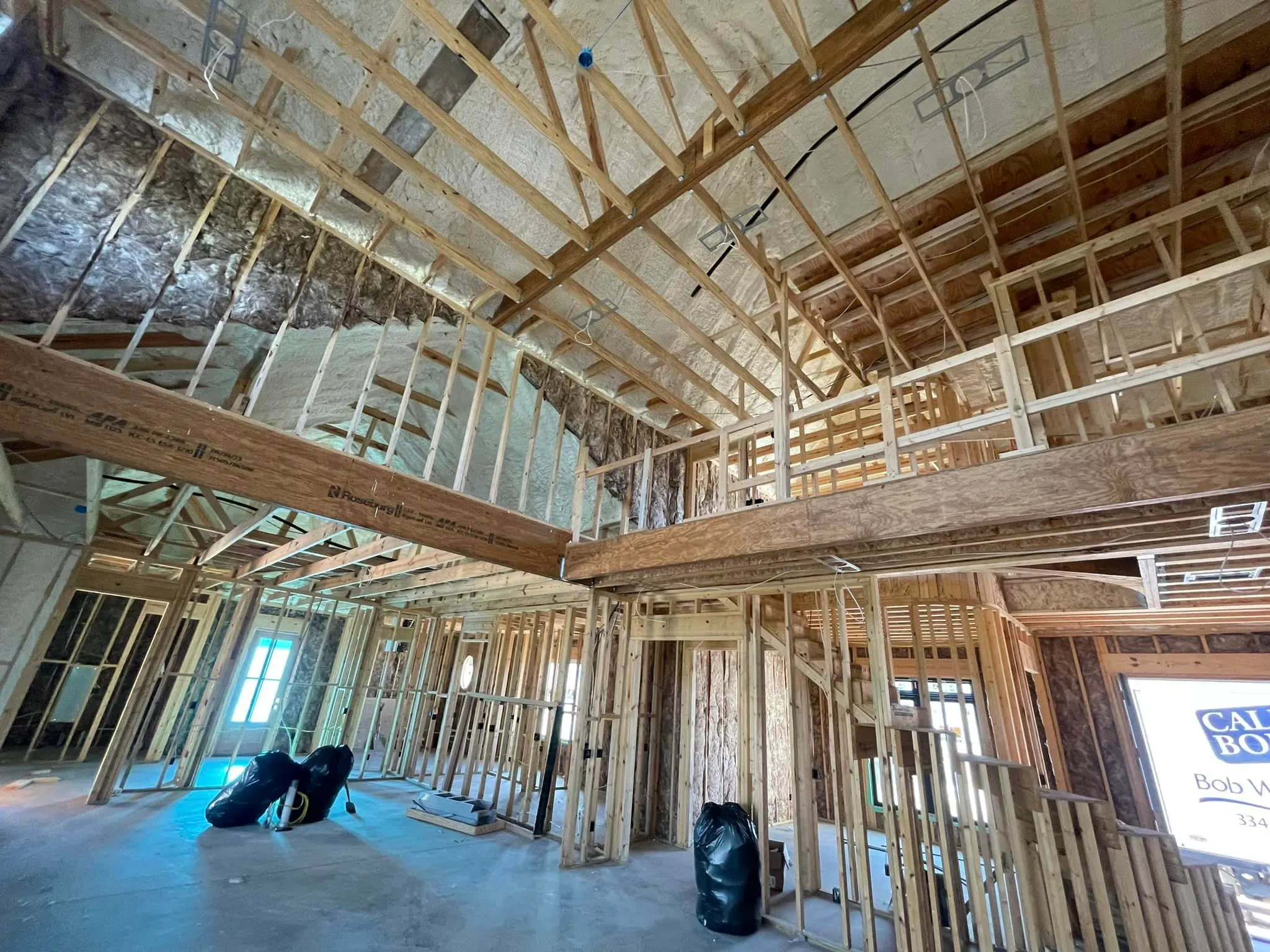
Insulating a new construction properly can save thousands of dollars in energy costs, make your home or business more comfortable, and enhance indoor air quality. Whether you’re building a new house, a commercial space, or any other type of construction in Tallahassee, getting the insulation right the first time is critical. In this guide, we’ll share some expert tips to help you choose the best insulation for new construction insulation in the Tallahassee area, including considerations for climate, insulation types, and specific needs of different building structures.
Tallahassee’s hot, humid summers and mild winters mean that energy efficiency should be a primary goal for new construction. A well-insulated home or building will help regulate the temperature inside, keeping your living space cool during the sweltering summer and maintaining warmth during cooler months. Proper insulation also keeps moisture at bay, reducing the risk of mould—a critical factor for Tallahassee homeowners and builders.
Without proper insulation, you could face unnecessarily high energy bills and discomfort due to fluctuating temperatures. Addressing insulation needs upfront during the new construction phase ensures that future occupants enjoy a more comfortable environment while reducing energy expenses year-round.
Selecting the best insulation material for your new construction project depends on several factors. Below, we’ll discuss different types of insulation that work best for various needs and preferences.
Open-cell spray foam is a popular choice for new constructions in Tallahassee because it provides effective air sealing, which is vital in hot and humid climates. Its softer, sponge-like texture allows it to expand significantly when applied, filling gaps and crevices that traditional insulation cannot.
Benefits of Open Cell Spray Foam:
Considerations: Open-cell foam is vapour-permeable, which means it can absorb moisture. Therefore, it’s essential to ensure it’s appropriately installed in areas where moisture management is critical.
Closed-cell spray foam is denser than open-cell foam and creates a more rigid structure. This type of insulation is often used in both residential and commercial applications where moisture resistance and structural reinforcement are needed.
Benefits of Closed Cell Foam Insulation:
Considerations: While closed-cell spray foam offers superior performance, it tends to be more expensive. However, the investment pays off with better long-term performance in areas prone to high moisture, like crawl spaces and basements.
Crawl spaces are often overlooked in new construction, but insulating them properly is essential for energy efficiency and reducing humidity in Tallahassee’s climate. Crawl space encapsulation involves sealing and insulating the area, creating a dry, controlled environment beneath your home.
Benefits:
Subfloor insulation is crucial, particularly if the structure is elevated or built on stilts. The primary goal is to prevent air from circulating below the floor, which can lead to unwanted temperature variations inside the home or building.
Best Practices:
Metal buildings and pole barns are becoming increasingly common in Tallahassee and surrounding areas for residential and commercial purposes. Proper insulation is crucial in these types of structures to avoid condensation and maintain a stable internal temperature.
Tips for Insulating Metal and Pole Barns:
Commercial buildings in Tallahassee face unique challenges, such as increased occupancy, extensive HVAC systems, and diverse functional spaces. Choosing the proper insulation for commercial buildings can impact everything from energy efficiency to indoor air quality.
Recommended Insulation Options:
The R-value measures the insulation’s resistance to heat flow. The higher the R-value, the more influential the insulation. Tallahassee’s climate requires a mix of R-values depending on the area being insulated—attics, walls, and crawl spaces each have different optimal R-values.
General Guidelines:
These values will ensure the building remains energy efficient and comfortable throughout the year.
Tallahassee’s humid environment demands that moisture management be a top priority. Vapor barriers, closed-cell spray foam, and proper sealing can help prevent moisture from accumulating, which could otherwise lead to mold and mildew issues.
The effectiveness of insulation depends heavily on the quality of the installation. Even the highest quality insulation will only perform as expected if there are gaps or if it’s adequately compressed. Hiring professionals who understand the specific requirements of new construction insulation in Tallahassee is essential.
Proper insulation in new construction is critical to ensuring comfort, energy efficiency, and durability. Whether you’re planning a new home, a commercial building, or any other type of project, Premier Insulation Plus is here to help you make the right choices.
Our team has extensive experience insulating new constructions across Tallahassee, Chipley, Panama City, Bonifay, Vernon, Destin, Defuniak Springs, Dothan, the Florida Panhandle, and Blountstown, FL. From spray foam insulation to crawl space encapsulation, we’re committed to providing high-quality services that make a difference.
Get in touch with us today to learn more or to schedule an appointment:
Let Premier Insulation Plus help you create a more comfortable, energy-efficient space with expert insulation solutions tailored to your new construction needs.
What type of insulation is best for new homes in Tallahassee?
Open-cell spray or closed-cell foam are excellent choices, depending on moisture concerns and budget.
How does crawl space encapsulation benefit my new construction?
It prevents moisture and pests from entering while improving energy efficiency and indoor air quality.
Is spray foam worth the cost compared to fibreglass?
Yes, spray foam provides better air sealing and moisture resistance, making it a better long-term investment in Tallahassee’s humid climate.
Can insulation help with noise reduction?
Yes, especially open-cell spray foam, which is an effective sound barrier.